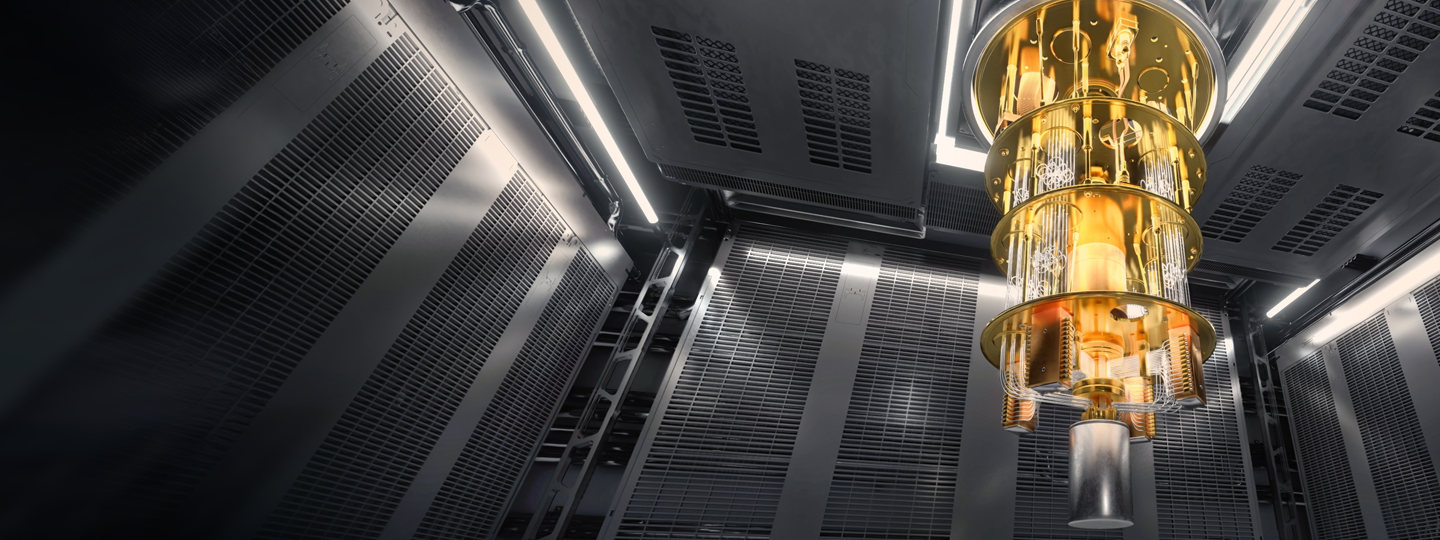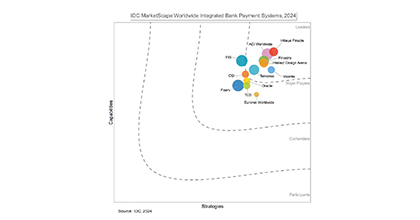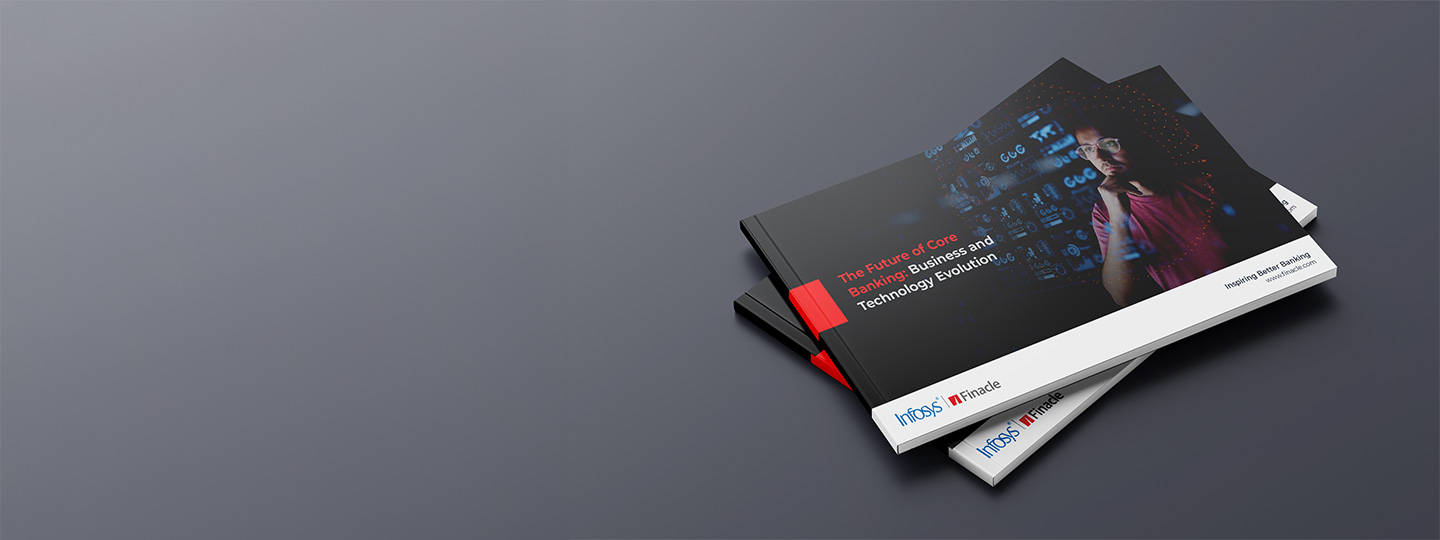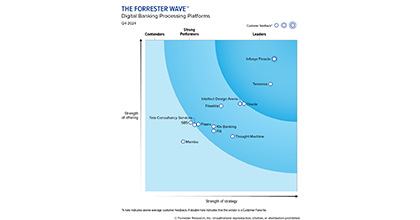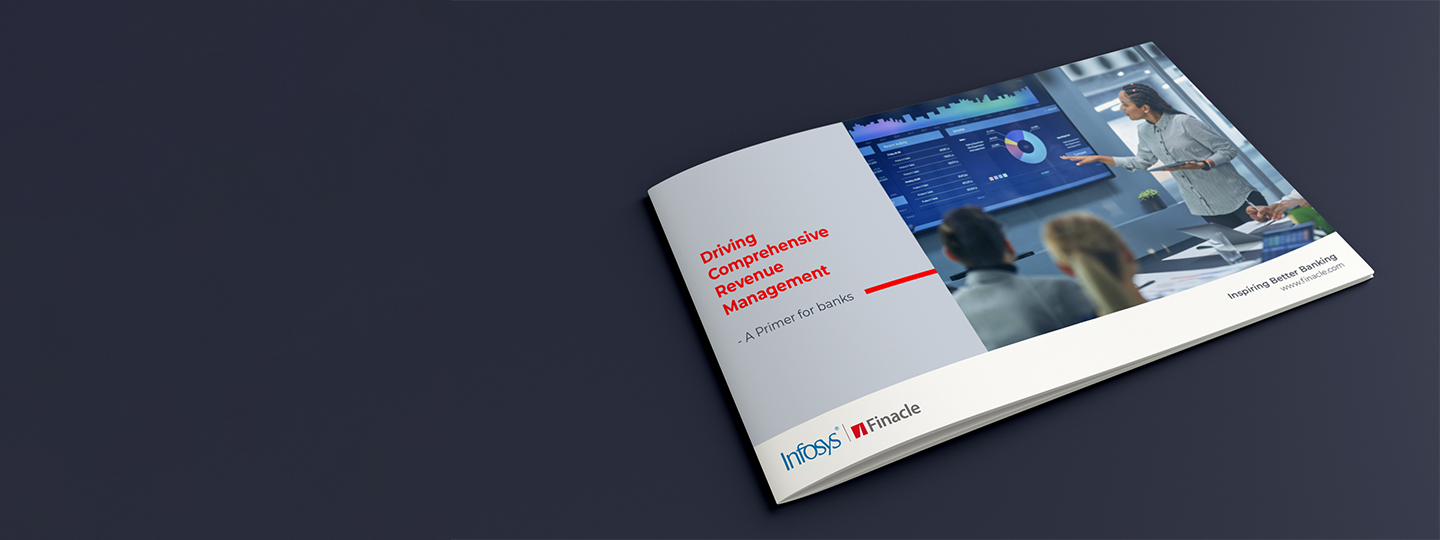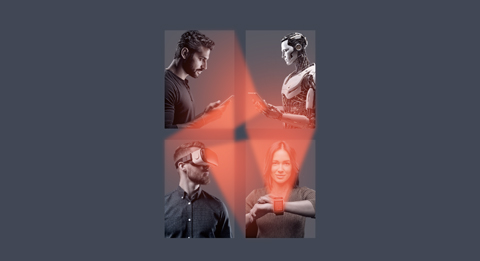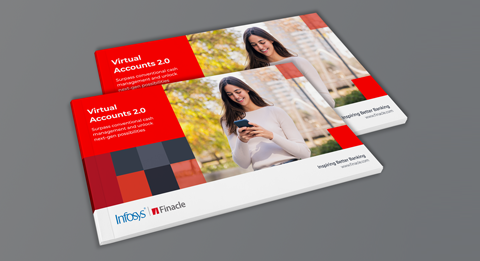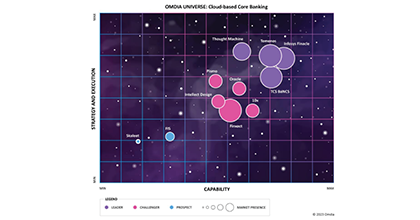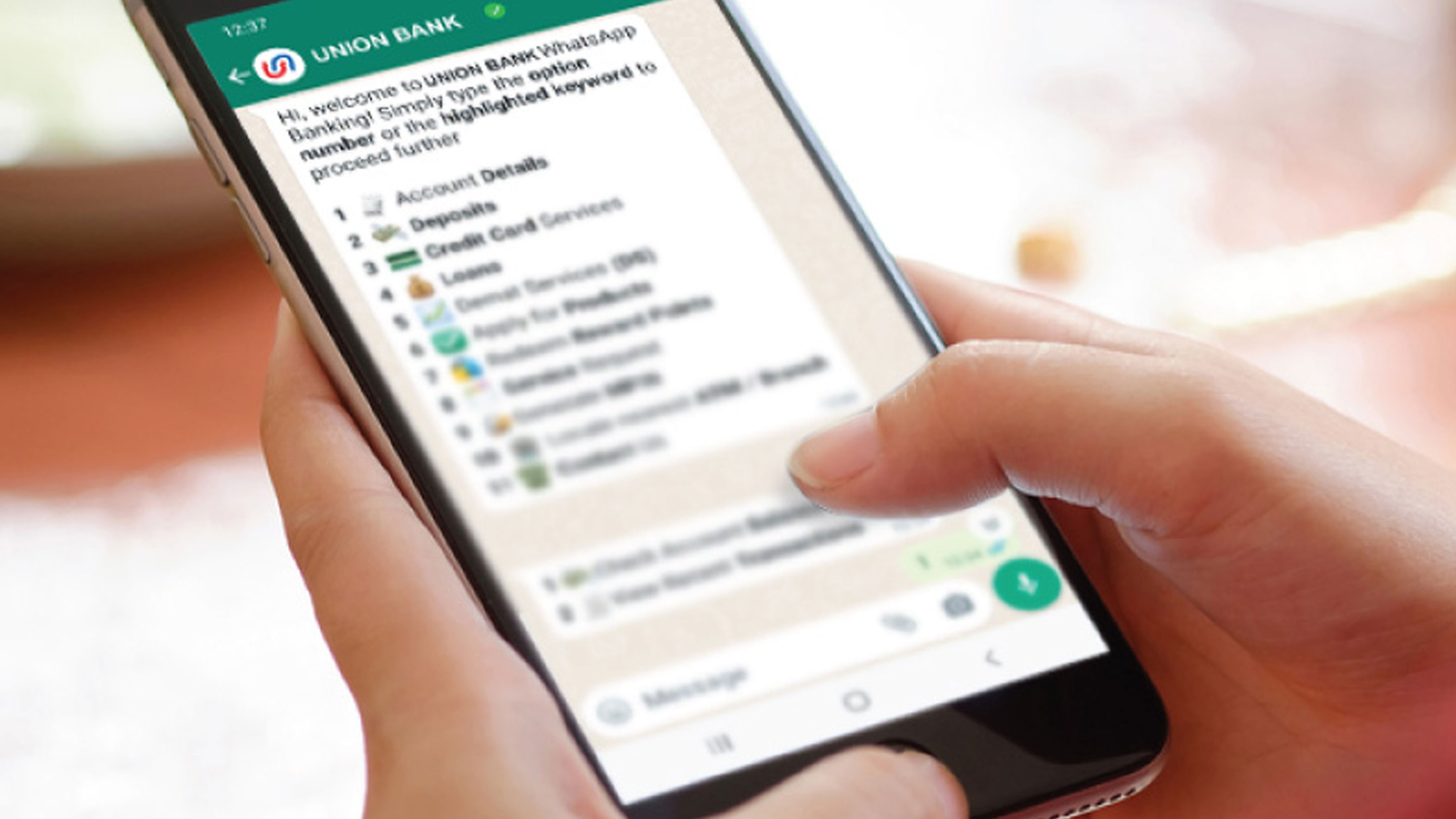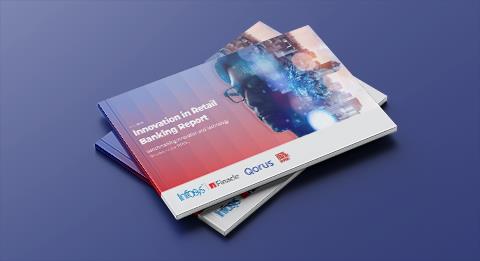-
![]() Quantum Computing: As the Future Awaits, The Strides Are DefinitiveQuantum computing is no longer confined to theory or the edges of experimental science - it is rapidly advancing toward practical impact.Read More
Quantum Computing: As the Future Awaits, The Strides Are DefinitiveQuantum computing is no longer confined to theory or the edges of experimental science - it is rapidly advancing toward practical impact.Read More -
![IDC IDC]() IDC MarketScape: Worldwide Integrated Bank PaymentFinacle Payments is an enterprise payments services system that manages end-to-end payments across instrument types, payment schemes, transaction types, customeRead More
IDC MarketScape: Worldwide Integrated Bank PaymentFinacle Payments is an enterprise payments services system that manages end-to-end payments across instrument types, payment schemes, transaction types, customeRead More -
![]() Supply Chain FinanceToday, as businesses seek to make their ecosystems more resilient, Supply Chain Finance (SCF) has emerged as a powerful lever for banks and financial institutions to support clients, while unlocking new revenue streams.Read More
Supply Chain FinanceToday, as businesses seek to make their ecosystems more resilient, Supply Chain Finance (SCF) has emerged as a powerful lever for banks and financial institutions to support clients, while unlocking new revenue streams.Read More
-
![]() The Future of Core Banking: Business and Technology EvolutionOur point of view paper, “The Future of Core Banking: Business and Technology Evolution”, serves as a candid and forward-looking benchmark of your institution’s readiness—and a strategic playbook for core modernization.Read More
The Future of Core Banking: Business and Technology EvolutionOur point of view paper, “The Future of Core Banking: Business and Technology Evolution”, serves as a candid and forward-looking benchmark of your institution’s readiness—and a strategic playbook for core modernization.Read More -
![The Forrester Wave The Forrester Wave]() Forrester Wave Digital Banking, Q4 2024Finacle is best suited for large retail, SMB, and corporate banks who seek a modern, comprehensive, innovative platform with superior support.Read More
Forrester Wave Digital Banking, Q4 2024Finacle is best suited for large retail, SMB, and corporate banks who seek a modern, comprehensive, innovative platform with superior support.Read More -
![]() Driving Comprehensive Revenue ManagementDiscover why revenue management must evolve into a comprehensive, strategic capability. Decode a blueprint to overcome challenges and unlock sustainable monetization.Read More
Driving Comprehensive Revenue ManagementDiscover why revenue management must evolve into a comprehensive, strategic capability. Decode a blueprint to overcome challenges and unlock sustainable monetization.Read More
-
![]() Shaping Banking’s Next: Banking Technology Trends for 2025 and BeyondThe banking industry has been balancing disruption and opportunity for several years now, and the pace of change shows no signs of slowing as we move into 2025 and beyond.Read More
Shaping Banking’s Next: Banking Technology Trends for 2025 and BeyondThe banking industry has been balancing disruption and opportunity for several years now, and the pace of change shows no signs of slowing as we move into 2025 and beyond.Read More -
![]() Virtual Accounts 2.0: Surpass Conventional Cash Management and Unlock Next-Gen PossibilitiesVirtual Account Management was a groundbreaking shift in the banking landscape, revolutionising use cases like cash concentration, pooling, centralised treasury management, and in-house banking (POBO, ROBO, COBO)Read More
Virtual Accounts 2.0: Surpass Conventional Cash Management and Unlock Next-Gen PossibilitiesVirtual Account Management was a groundbreaking shift in the banking landscape, revolutionising use cases like cash concentration, pooling, centralised treasury management, and in-house banking (POBO, ROBO, COBO)Read More -
![]() Unlocking Hybrid CloudAs banks push forward with their digital transformation agenda, cloud serves as a pivotal enabler. Each bank, at varying stages of adoption, crafts its unique path, dictated by context, regulations, and risk appetite.Read More
Unlocking Hybrid CloudAs banks push forward with their digital transformation agenda, cloud serves as a pivotal enabler. Each bank, at varying stages of adoption, crafts its unique path, dictated by context, regulations, and risk appetite.Read More
-
![]() Banking on CloudThis report from Infosys Finacle delves into the need for accelerating cloud adoption, highlights the current state of the industry, and puts forth key recommenRead More
Banking on CloudThis report from Infosys Finacle delves into the need for accelerating cloud adoption, highlights the current state of the industry, and puts forth key recommenRead More -
![]() Omdia Universe | Cloud-based Core BankingIn the report, Omdia highlights the following key capabilities of leading cloud-based core banking providers:Read more
Omdia Universe | Cloud-based Core BankingIn the report, Omdia highlights the following key capabilities of leading cloud-based core banking providers:Read more
-
![]() Emirates NBDEmirates NBD consolidates its operations on a single version for scalability, agility, and standardization.Read More
Emirates NBDEmirates NBD consolidates its operations on a single version for scalability, agility, and standardization.Read More -
![]() A Global Top 5 BankDiscover how a global top 5 bank headquartered in the US accelerated payments transformation.Read More
A Global Top 5 BankDiscover how a global top 5 bank headquartered in the US accelerated payments transformation.Read More -
![]() Union Bank of IndiaUnion Bank of India launches Union Virtual Connect (UVConn) by leveraging WhatsApp to provide customers personalized banking services.Read More
Union Bank of IndiaUnion Bank of India launches Union Virtual Connect (UVConn) by leveraging WhatsApp to provide customers personalized banking services.Read More

Treasury on the Go!
Blogs
September 11, 2001 6.00 PM IST, Location: Fort Mumbai; Traders are slowly beginning to square off their positions and getting ready to head home. I grabbed my last cup of tea and slowly started to pack up for the day. “Dollar crashed,” someone screamed from the crosses desk. US under terror attack was flashing on the TV screen. “What’s our exposure in USD?” asked my treasurer in a feeble voice. “We are all square. Nothing to worry but I am bothered about my correspondents. Both AMEX and ABN are at the World Trade Center (WTC). Not sure when will we get our Nostro statement again”!
Images of the twin towers crashing down were surreal. The scene looked straight out of a Hollywood flick.
07:30 PM IST: Mumbai local train is abuzz with the stories of attacks on US. There were no smartphones, Blackberries or Tablets then. People getting into the local train at every stop had their own version of what was going on.
September 12, 08:00 AM: I am sitting before the SWIFT terminal to download the statements. I’ve just sent a mail to AMEX and ABN enquiring about their wellbeing and also informed all the retail outlets that we are not expecting USD statements today and there will be a delay in processing remittances.
09:30 AM: Messenger delivered AMEX and ABN Nostro statements at my desk. I was shell shocked. Where did I get these copies from? ABN and AMEX sent hard copies of our account statements from their Mumbai offices. For the first time, I heard about DRS (Disaster Recovery Site) and BCP (Business Continuity Plan) and saw the real DRS and BCP in action.
News had finally sunk in and everybody was getting ready to embrace the day post 9/11. It was a new day, a new era and perhaps a new beginning for many of us.
A graduate in bioscience, who happened to join a bank, with no real education in computers and technology, I was in complete awe of all that was happening around. That was my first real tryst with technology and for the first time I could appreciate what US stands for in terms of technological advancement and why USA was what it was. Well this is not a eulogy about USA, but a real life experience of how the events that happened a thousand miles away had impacted each one of us. It’s not that it took me 10 years to narrate this story but it actually took 10 years to relate to the events that unfurled before me that night. I was reading an article about innovation in technology and suddenly the memories of that fateful night flashed before my eyes and I started wondering if things would have been any different if we had today’s technology available then. Well, all that is history now but in hindsight I can certainly ask a few questions:
- Did I have to rely upon hearsay information if we had smartphones, Blackberry or Tablets then?
- Did traders really need to spend the night in trading rooms if they had any of these handheld devices?
- Did I really need to struggle till next day morning to know if I would receive my account statement?
- Why can’t a trader work from the comfort of his home?
- Why can’t a mobile or a tablet double up as a workstation?
The connotation of mobility has metamorphosed over the years. From simple calling to powerful mobile computing, handheld devices have virtually taken PCs, data and software out into the field. Mobility is not a fad, it’s real and it’s here to stay. To imagine that treasurers and investment bankers need to be in their sea facing offices to make decision is utterly myopic. Mobility is as much a need for a treasurer as it would be for a sales head. Technology has evolved over the decade and what was impossible then is hygiene today.
Global treasuries pretty much function round the clock and it’s not possible for a treasurer to be present in all the locations or at office 24×7. What a global treasurer would need is an alert on his handheld device to alert him when stop losses are breached at any of the centers or when any of the major pairs breach an upper or lower barrier and when options are nearing expiry. What is really important is the proximity to the market rather than to the physical office.
We know for sure that almost all the treasury systems can interface with trading platforms, but now the demand, which may well be a need tomorrow, is Trade on the go. To the naysayers the idea may sound like a fad, but the future, whether we like it or not is going to be mobile.



©2026 -Edgeverve Systems Limited | All rights reserved
